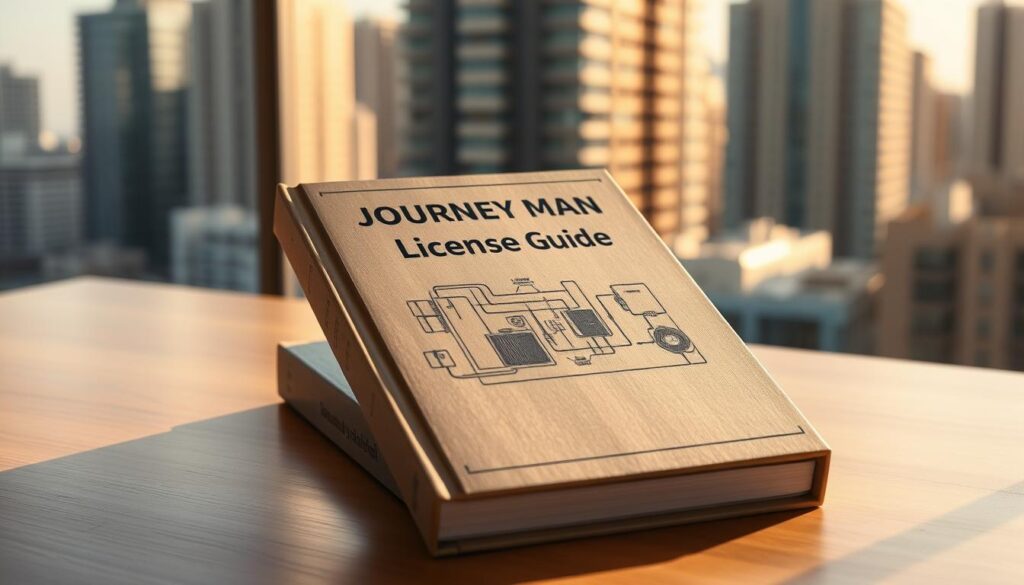Affiliate Disclosure
HVAC Guide Guys is a participant in the Amazon Services LLC Associates Program, an affiliate advertising program designed to provide a means for sites to earn advertising fees by advertising and linking to Amazon.
How to Get a Journeyman HVAC License? To get a journeyman HVAC license, you need education, training, work experience, and certifications. Every state has its own rules for becoming a licensed HVAC technician. These rules help ensure you’re ready to work safely and well.

Getting a journeyman HVAC license can seem hard, but this guide makes it easier. Each state has its own rules for HVAC licenses. It’s important to know what you need in your area.
HVAC technicians must meet high standards to keep people safe and work well. If you’re starting or want to grow in your HVAC career, knowing the licensing rules is key. It’s the first step to becoming a respected HVAC expert.
Key Takeaways
- Licensing requirements differ by state and local jurisdictions
- Comprehensive training and education are essential
- Work experience plays a crucial role in obtaining a license
- EPA Section 608 Certification is typically mandatory
- Continuing education is necessary for license maintenance
Table of Contents
Understanding HVAC Licensing Requirements
Getting into the HVAC world can be tricky. Each state has its own rules for HVAC licenses. Knowing these rules is key to starting your HVAC career.
State vs Local Licensing Variations
HVAC licenses vary across the U.S. Some states have one rule for everyone. Others let cities or counties set their own rules. This means your area might have special rules that others don’t.
- Statewide licensing covers entire geographic regions
- Local licensing focuses on specific city or county regulations
- Some areas require both state and local credentials
Personal Requirements for Licensing
To get an HVAC license, you must meet certain personal standards. These include age, education, and work experience. Most states ask for:
- Minimum age of 18 years
- High school diploma or equivalent
- Completed apprenticeship program
- Verified work experience hours
EPA Section 608 Certification Overview
All HVAC techs must have EPA Section 608 certification. This is a federal rule. It makes sure techs know how to handle refrigerants safely.
| Certification Type | Refrigerant Handling Level |
|---|---|
| Type I | Small appliances |
| Type II | High-pressure appliances |
| Type III | Low-pressure appliances |
| Universal | All refrigerant types |
Knowing the HVAC licensing rules is important for your career. Every step you take gets you closer to being a certified HVAC tech.
Explore Our HVAC Shop
Looking for top-rated HVAC tools, parts, and accessories? Visit our shop and find the perfect solution for your needs.
Visit the ShopHow to Get a Journeyman HVAC License
Getting a journeyman HVAC license takes hard work and planning. The process has several key steps. These steps turn your dream job into a real career. You’ll go through education, hands-on experience, and getting certified.
Your journey to get an HVAC license includes important parts:
- Complete an accredited HVAC training program
- Accumulate required work experience under licensed professionals
- Pass comprehensive licensing examinations
- Submit official documentation to state licensing boards
The path to a journeyman HVAC license needs dedication and planning. Most states ask for 2-5 years of documented work experience. During this time, you’ll learn from experienced technicians. You’ll pick up advanced skills and industry standards.
Here are the main things you need for your HVAC license application:
- Proof of completed apprenticeship or training program
- Verification of supervised work hours
- Successful completion of state-specific licensing exams
- EPA Section 608 Certification
- Background check and application fees
Each state has its own rules for licensing. It’s important to check your state’s specific needs. Talking to local HVAC licensing boards will give you the best advice for your career.
Education and Training Prerequisites
To become a top HVAC pro, you need a smart plan for learning and practice. Your path will mix classroom lessons and hands-on work. This combo gets you ready for a fulfilling HVAC career.
Apprenticeship Programs: Your Path to Expertise
HVAC apprenticeships give you deep training. They mix:
- Paid on-the-job training with pros
- Classroom lessons at tech schools
- Curriculum that teaches key HVAC skills
- Work under licensed journeymen
Trade School Options for HVAC Training
HVAC trade schools offer focused education to kickstart your career. They provide in-depth classroom training. This covers important HVAC topics like:
- Heating and cooling system design
- Electrical systems
- Refrigeration tech
- Safety and industry standards
Classroom Training Requirements
Most states require certain classroom hours for HVAC training. You’ll need 500 to 1,000 hours of formal instruction. These hours teach you the basics for certification and real-world HVAC challenges.
Pro Tip: Pick an accredited HVAC trade school or apprenticeship that meets your state’s needs and offers thorough training.
Work Experience Requirements by State

To get your journeyman HVAC license, you need to meet certain work experience rules. These rules change from state to state. It’s important to know these rules to move forward in your HVAC career.
Getting your experience usually means working under a licensed contractor. Most states ask for 2-5 years of experience before you can get a journeyman license. The exact time needed depends on your state’s rules and the HVAC work you do.
- Residential HVAC experience
- Commercial system installation
- Maintenance and repair work
- Supervised apprenticeship programs
You must keep records of your work experience. Each state has its own rules for these records. Keeping accurate records is key to a smooth license application.
Some states have special rules for certain HVAC jobs:
- Refrigeration systems
- Heating installation
- Air conditioning maintenance
- Industrial HVAC applications
To check if you meet your state’s rules, talk to your local licensing board or HVAC association. They can give you the latest info on what’s needed in your area.
Essential Skills and Knowledge Assessment
To be a top HVAC journeyman, you need to know a lot about technical skills, safety, and industry rules. Mastering these areas is key to doing well in your job and growing in your career.
Technical Proficiencies
Having strong HVAC technical skills is vital for success. These skills help you fix and keep up complex heating, ventilation, and air conditioning systems.
- Advanced system diagnostics
- Electrical circuit understanding
- Refrigeration cycle comprehension
- Mechanical system troubleshooting
- Digital control system integration
Safety Protocols
Safety is a big deal in HVAC. Knowing how to keep safe helps you and your clients avoid dangers from complex systems.
| Safety Category | Key Requirements |
|---|---|
| Personal Protection | Protective gear, proper equipment handling |
| Electrical Safety | Lockout/tagout procedures, voltage testing |
| Chemical Handling | Refrigerant management, leak detection |
Industry Standards
Keeping up with industry standards is important. HVAC industry standards change a lot, so you need to keep learning and adapting.
- ASHRAE guidelines compliance
- EPA refrigerant regulations
- Energy efficiency standards
- Building code requirements
By focusing on these key skills and knowledge, you’ll be seen as a skilled and dependable HVAC pro. You’ll be ready to handle many technical challenges.
Explore Our HVAC Shop
Looking for top-rated HVAC tools, parts, and accessories? Visit our shop and find the perfect solution for your needs.
Visit the ShopLicensing Exams and Testing Procedures
Passing the HVAC licensing exam is a big step in your career. It checks if you really know about heating, ventilation, and air conditioning systems. You’ll face different ways of testing your knowledge.

- Theoretical knowledge assessment
- Practical skills demonstration
Each state has its own way of testing, but most use multiple-choice questions. These questions test your technical skills. You’ll see questions on:
- System design principles
- Installation techniques
- Maintenance procedures
- Troubleshooting strategies
“Preparation is the key to success in your HVAC licensing exam” – Professional HVAC Licensing Board
To prepare well, study a lot, practice with sample questions, and learn how to manage your time. Most states need you to score at least 70% to get your journeyman HVAC license.
| Exam Component | Weight | Focus Areas |
|---|---|---|
| Written Exam | 70% | Technical Knowledge |
| Practical Exam | 30% | Hands-on Skills |
Take time to learn about the exam formats, study the right materials, and do mock tests. This will help you pass the HVAC licensing exam.
Insurance and Bonding Requirements
Understanding HVAC insurance needs is key for your career success. Insurance and bonding protect your business and clients. They are essential as you grow in your field.
Professional HVAC technicians need to focus on several important areas for full protection:
- General liability coverage
- Workers’ compensation insurance
- Surety bonds
- Professional indemnity protection
General Liability Coverage
General liability insurance shields your business from financial losses. It’s vital for HVAC pros working in different settings. Coverage usually falls between $500,000 to $2 million, based on your business size and risks.
Workers’ Compensation Requirements
Workers’ compensation is a must-have for your employees’ safety. It’s required for HVAC businesses with more than one worker. This insurance covers medical costs and lost wages for job-related injuries or illnesses.
Surety Bond Guidelines
Surety bonds are a financial promise of your work quality. They ensure you’ll finish projects as agreed. Bond amounts for HVAC contractors vary from $10,000 to $50,000, based on state rules and project needs.
Having the right insurance and bonding shows you’re professional. It also safeguards your business from financial dangers.
State-Specific Licensing Boards and Authorities
Understanding HVAC licensing needs a good grasp of your state’s rules. Each state has its own HVAC licensing boards and state authorities. They oversee professional qualifications and standards.
Different licensing agencies have key roles in HVAC professional certifications. Their main duties include:
- Setting licensing requirements
- Running professional exams
- Keeping professional standards high
- Ensuring public safety through strict qualification checks
“Knowing your state’s licensing rules is key to a successful HVAC career.” – Professional HVAC Association
Knowing these agencies helps you follow the rules and grow in your career. Each state’s HVAC licensing rules are different. It’s very important to learn about your state’s specific needs.
| State | Primary Licensing Agency | Contact Information |
|---|---|---|
| California | Contractors State License Board | (800) 321-CSLB |
| Texas | Texas Department of Licensing | (512) 463-6599 |
| Florida | Construction Industry Licensing Board | (850) 487-1395 |
Getting involved with your state’s licensing boards can offer great benefits. You’ll get updates on certification needs and chances for professional growth.
License Maintenance and Renewal Process
Keeping your HVAC license up to date is key to your career. Each state has its own rules for renewing your license. You must follow these rules to keep your license active.
The steps to maintain your license include:
- Tracking renewal deadlines
- Completing required continuing education credits
- Submitting renewal documentation
- Paying renewal fees
Continuing education is vital for your license. Most states require a certain number of hours to keep you updated with the latest in HVAC.
| Renewal Frequency | Average Continuing Education Hours | Typical Renewal Fee |
|---|---|---|
| 1-3 Years | 4-16 Hours | $50-$200 |
Renewing your HVAC license needs careful planning. Keep track of your training and renewal dates. Make sure to finish all required training before your license expires.
Staying ahead of license maintenance ensures uninterrupted professional practice and demonstrates your commitment to excellence in the HVAC industry.
For a smooth renewal, set reminders, keep your documents in order, and choose approved courses. These steps will boost your skills and knowledge.
Explore Our HVAC Shop
Looking for top-rated HVAC tools, parts, and accessories? Visit our shop and find the perfect solution for your needs.
Visit the ShopContinuing Education Requirements
Staying up-to-date in the HVAC field is crucial. It means you’re always ready for new challenges. HVAC continuing education keeps you ahead, knowing the latest in your field.
Required Training Hours
States require you to take certain hours of education each year. These hours can be 6-24, depending on where you live and your level of certification.
- Minimum annual training: 6-10 hours
- Advanced certification tracks: 12-24 hours
- Online and in-person course options available
Approved Course Topics
These courses are key to improving your skills and knowledge. They cover important topics like:
- Updated building codes and regulations
- Energy efficiency techniques
- Advanced HVAC technologies
- Safety protocols and best practices
- Environmental compliance standards
Certification Tracking and Renewal
For HVAC pros, learning never stops. Keeping track of your education hours is important. It helps you renew your license and shows your dedication to your work.
“Continuous learning is the minimum requirement for success in any field.” – Brian Tracy
| Certification Type | Annual Hours Required | Renewal Cycle |
|---|---|---|
| Journeyman HVAC License | 8-16 hours | Every 2 years |
| Master HVAC Technician | 16-24 hours | Every 3 years |
| EPA Section 608 Certification | 4-8 hours | Every 5 years |
Investing in HVAC continuing education is smart. It keeps your credentials strong and makes you a top technician in a changing field.
Conclusion
Getting a journeyman HVAC license is a big step in your career. It takes hard work, planning, and learning many technical skills. This step opens doors to many opportunities in the HVAC field.
Having a license does more than just show you’re certified. It makes you stand out as a reliable professional. Employers look for people who are skilled and follow industry rules.
Your career will grow if you keep learning and know about new technologies. See each licensing step as a chance to get better and meet new people. With hard work and learning, you can make your career in HVAC strong and lasting.
Your license shows you’re good at your job. Keep learning, stay up-to-date, and be ready to change. Your hard work now will make you respected in your field tomorrow.

